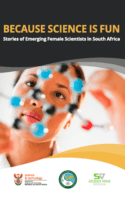“My solemn belief is that a country’s curriculum is the only document that has revolutionary potential. One can change the world if one could change a curriculum,” said Professor Petro du Preez of the North-West University (NWU).
Petro, Associate Professor in Curriculum Studies & Former Research and Development Coordinator for the Faculty of Education Sciences, believes this is true whether at basic or higher levels of education.
She believes in continuously making people aware of social justice, equality and striving for the upliftment of a human rights culture through innovative leadership.
“Our history, and that of many countries abroad, is permeated with examples of how a curriculum has had a positive or negative influence on the youth and their way of thinking.”
It is Petro’s focus to ensure that human rights is integrated into the curriculum, not merely as a legal construct that has to be taught in the formal curriculum, but as a moral construct that has to be infused in all aspects of school and university life.
A country’s curriculum is the only document that has revolutionary potential
She believes that this can only be done in a caring, activist-oriented environment in which people can freely engage in poignant dialogue towards emancipating those in the most vulnerable environments.
“In many European contexts, religious education is studied as a discrete subject. She has demonstrated the importance of seeing the issues raised from a broad ‘Bildungstheoretische’ position,” said Prof Dr Gordon Mitchell from the University of Hamburg.
Petro grew up in Bellville in Cape Town and surprised herself and her parents by ending up in a career as an academic as she initially trained as a nurse. The trauma of working with terminally ill children was too much. Especially heart-breaking were instances where the parents were not able to visit their dying children because they did not have money to get to the hospital.
“I remember thinking that I would rather look after 50 naughty children than one sick child,” said Petro.
At a crossroads after a year in the nursing profession, Petro enrolled at Stellenbosch University (SU) for a BEd with the intention of becoming a teacher.
In her third year her Professor, Cornelia Roux, encouraged her to think about a life in research.
“She brought me into her research world, which I found very interesting and the more I worked with her, the more I was enticed to follow a career as an academic.”
Petro ended up completing her Honours, Masters and PhD at SU. She was awarded the German Exchange Service Scholarship to complete her PhD and as a part of that spent three months in Germany at the University of Hamburg.
It was an enjoyable few months as she was able to focus on her PhD and chat to international students who were doing similar work. “Experiencing another academic culture is definitely something that I would recommend to all students.”
Upon graduating she worked for SU for a year as an assistant lecturer while conducting research before being offered an opportunity to do a postdoctorate at the NWU. “Petro has a very inquiring mind, is very sharp in argumentation and is scholarly sound. She is the best student I have ever had in my 34 years in academics,” said Cornelia.
Although Petro is eager to learn and experience all the facets of academic scholarship, she is very supportive of novice, up-and-coming colleagues.
“I believe in ‘paying it forward’ by creating opportunities for other novice academics,” Petro said.
Petro, however, is concerned about the lack of initiative from students to search for funding themselves, particularly considering the fact that a lot of funding is available. “A lot of funding goes to waste because it is not used, which is a shame.”
She is always on the lookout for funding. According to her, most universities have a research office which is her starting point for finding new funding. “Students should not depend on the efforts of others or wait for someone else to tell them what to do when it comes to finding bursaries. They need to put their own effort into the search and they need to be persistent with applications.”
“I’ve got a revolutionary spirit and love taking risks in the spirit of leading, moving and shaking existing ways of doing and knowing. I’m passionate and energetic about my research and what I believe in and would like my students to pick up on my passion too.”


